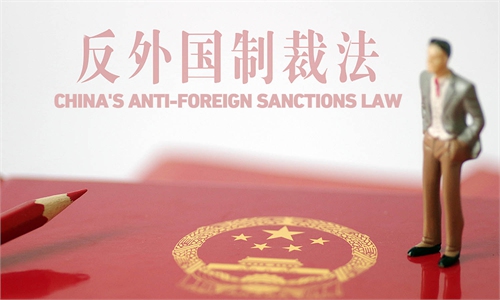COMMENTS / EXPERT ASSESSMENT
Instead of criticizing China’s anti-sanctions laws, the West should reflect on itself

illustration: Xia Qing/GT
While China has clarified that the newly passed Anti-foreign Sanctions Law is a defensive tool to counter foreign bullies and won't affect the country's expanding opening-up, some in the West have not stopped their political blame game when it comes to the legislation.
The BDI industry association reportedly pointed fingers at China's passage of the law, saying it is creating "new uncertainties" to investors and companies abroad and it "undermines legal clarity," the Reuters reported.
A few days ago, Joerg Wuttke, the president of the European Union Chamber of Commerce, reportedly criticized the law makes companies feel like they are "sacrificial pawns in a game of political chess."
Amid the US and EU's current escalation of tension with China, which was triggered by their unprovoked, arbitrary, and unilateral moves on China, it's no surprise that a certain degree of concern and skepticism among businesses in these countries after China's approval of the counter sanction law. However, when they are busy at worrying about political tensions' spilling over into commercial areas, they should not forget to look at the root of the problem.
Apparently, the supposed concerns among some business people in the West actually stem from their own prejudice against China. It is the governments of their own countries and allies that have effectively politicized economic issues through abuse of unilateral sanctions. Only when they can drop the prejudice can they see the fact clearly: they are actually "sacrificial pawns" being used in an anti-China political maneuver.
Instead of "undermining legal clarity" and "creating new uncertainties," China's new legal framework is expected to create a more predictable business environment marked by the rule of law. If China is forced to protect itself from new unilateral sanctions from the West in the future, the possibility of misunderstanding will be largely reduced. From this point of view, the passage of the law will instead dispel the worries and doubts of foreign companies.
When announcing the approval of the new anti-sanction law, China made it clear that this would not affect its determination to continue to expand its opening up. China has once again said that while resolutely safeguarding national security, it will also continue to expand laws on promoting opening up.
The passage of the new anti-sanctions law actually marks a new stage in China's balance between expansion of opening up and protection of its national interests. As China adheres to the principle of rule of law and aims for measured and necessary reform, it is believed that the doubts of foreign companies will be completely dispelled in the future. China overtook the US as the world's top destination for new foreign direct investment last year, more foreign investors are expected to be confident in China's appealing market and improving business environment.
While China continues to improve its business environment, it is urgent for the US-led Western camp to reckon with their own wrong practices. For instance, many Western countries have imposed bans on China's tech giant Huawei under the baseless guise of national security. Such discriminatory practices and crackdowns have exposed that Western countries as the initiators of politicized economic issues. It would be delusional for them to only expect China to show goodwill and simply bend to their will.
The author is director of the Department of European Studies, China Institute of International Studies. bizopinion@globaltimes.com.cn


